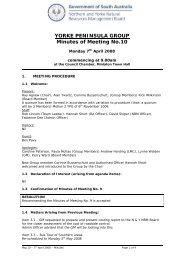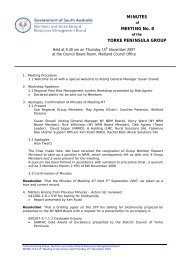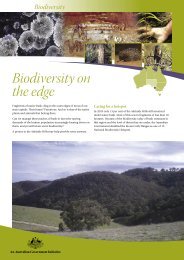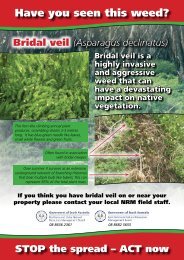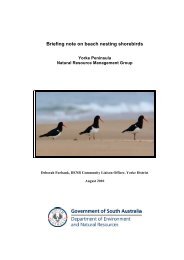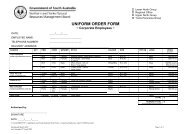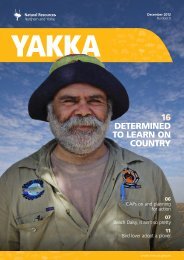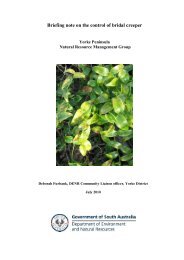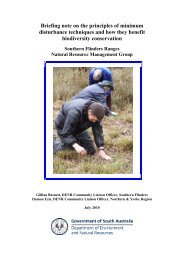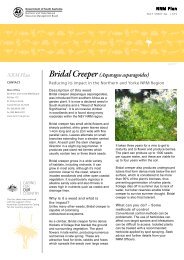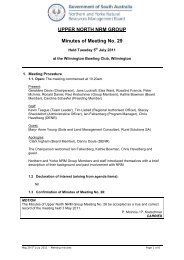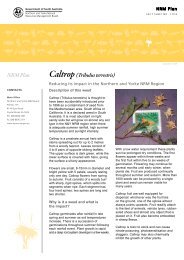Caring for country - Northern and Yorke Natural Resources ...
Caring for country - Northern and Yorke Natural Resources ...
Caring for country - Northern and Yorke Natural Resources ...
Create successful ePaper yourself
Turn your PDF publications into a flip-book with our unique Google optimized e-Paper software.
4ground work<br />
yorke peninsula<br />
Once a month, about 15 active members of the group,<br />
mostly from surrounding towns of Clare, Saddleworth,<br />
Auburn <strong>and</strong> Watervale, meet at the park <strong>for</strong> working<br />
bees to control weeds, maintain walking trails <strong>and</strong><br />
organise wild orchid walks to monitor their distribution.<br />
The Friends of Spring Gully have received a State NRM<br />
community grant to help control pest plants in the park<br />
such as briar roses, wild olives, topped lavender, genista,<br />
artichokes <strong>and</strong> milk weed.<br />
“The grant will allow us to purchase tools <strong>and</strong> chemicals<br />
to address the weed problem, which is particularly<br />
threatening in the waterways,” Elaine said.<br />
“The weeds can stifle native species <strong>and</strong> compete <strong>for</strong><br />
water <strong>and</strong> nutrients. It is very timely to receive this<br />
funding because the natural fauna <strong>and</strong> flora of the park<br />
is fighting to recover from a succession of drought years<br />
<strong>and</strong> the effects of recent fire.”<br />
Elaine said she hoped the purchase of safe, ergonomic<br />
tools would encourage other volunteers to help protect<br />
“a unique little part of South Australia.”<br />
Port Julia Progress Association members (pictured) are striving to live in harmony with their natural surroundings. Photo David Sloper Orroroo School<br />
students dig in<br />
Greening Port Julia<br />
to Pekina Creek<br />
revegetation project.<br />
Photo: Vanessa Size<br />
Port Julia is a small, coastal township on <strong>Yorke</strong> Peninsula<br />
where the residents are striving to live in harmony with<br />
their natural surroundings.<br />
Only a small proportion of the homes in Port Julia are<br />
permanent residences, yet the commitment to care <strong>for</strong> the<br />
natural resources is equally shared by those who live there, <strong>and</strong><br />
those who come <strong>for</strong> holidays.<br />
Port Julia Progress Association secretary, Kerryn Moses, said<br />
regular working bees to remove weeds, collect native seeds <strong>and</strong><br />
revegetate the surrounds helped to create a strong sense of<br />
community.<br />
“We know that many people come to relax <strong>and</strong> enjoy their<br />
holidays, so we have to find the right balance between their<br />
lifestyle choices <strong>and</strong> our ef<strong>for</strong>ts to protect <strong>and</strong> enhance the<br />
natural assets of the township,” she said.<br />
“I think we have done that successfully by making our working<br />
bees something of a social occasion that brings people from<br />
diverse backgrounds together. In terms of community <strong>and</strong><br />
environmental outcomes, we are making a difference.”<br />
With funding support from the <strong>Northern</strong> <strong>and</strong> <strong>Yorke</strong> <strong>Natural</strong><br />
<strong>Resources</strong> Management Board, the Port Julia Progress Association<br />
is working on a priority project to remove boxthorn <strong>and</strong> other<br />
weeds <strong>and</strong> revegetate a narrow strip of road reserve that links<br />
with an existing coastal reserve <strong>and</strong> walking trail in front of<br />
the town.<br />
Stretching about 2km, the reserve features significant trees <strong>and</strong><br />
understorey, <strong>and</strong> is an important corridor between two areas of<br />
natural scrub that provides habitat <strong>for</strong> a wide range of native<br />
plants <strong>and</strong> animals.<br />
However, weed infestation <strong>and</strong> grazing, resulting from fences in<br />
disrepair, has had a negative impact on the reserve.<br />
With NYNRM Board funding, contractors have been<br />
employed to remove large boxthorns, <strong>and</strong> progress so far<br />
has been significant. Members of the Progress Association<br />
are swinging in behind this ef<strong>for</strong>t to collect seeds from local<br />
plants, including sheoaks, melaleucas <strong>and</strong> coastal wattles,<br />
to propagate <strong>and</strong> revegetate the reserve. Fencing repairs are<br />
also required.<br />
“We have received wonderful support <strong>and</strong> guidance from<br />
David Sloper, the <strong>Northern</strong> <strong>and</strong> <strong>Yorke</strong> NRM Board’s NRM<br />
Officer on <strong>Yorke</strong> Peninsula.<br />
“We have also been working to remove pest plants from the<br />
areas of coastal shrub that adjoin the reserve <strong>and</strong> revegetate<br />
them with native plants from Trees For Life,” Kerryn said.<br />
“If future funding is available, we would like to continue the<br />
rehabilitation of this area, extend the walking trail through<br />
the reserve, <strong>and</strong> provide some interpretive signage,”<br />
Kerryn said.<br />
“Through our working bees, we are protecting <strong>and</strong><br />
enhancing the natural environment, but also building<br />
awareness about issues such as pest plants spreading from<br />
home gardens <strong>and</strong> threatening native habitat.”<br />
<strong>Northern</strong> <strong>and</strong> <strong>Yorke</strong> <strong>Natural</strong> <strong>Resources</strong> Management Board 7



